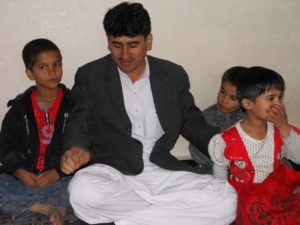By Fahim Abrahimi, House Manager at the House of Flowers for 13 years (from 2002 to 2015)
The House of Flowers was founded in 2002 and since the start I have been working for this home-based orphanage-school.

I remember very well in the early days when I met with Mr. Amanullah Nasrat and Dr. Mostafa Vaziri to buy a long list of things for the house we had rented in Kulula Pushta in Kabul for the orphanage.
After a few days of furnishing the house, we came to meet a man with three daughters. The story of this family bruised my heart so much. I was then only 22 years old and I had never seen or heard such a traumatic and bitter life experience even among the most troubled Afghan refugee families in Pakistan. The suffering of Afghan people inside Afghanistan was probably immeasurable compare to those Afghans who lived in Pakistan. I could only imagine how hard it may have been for the families during the war.
Each time I laid my eyes on each of the three girls I would feel sad especially watching the life condition of the youngest of the three, Shukria who was then only two years old – just an innocent child.
This experience led me to decide that I must do my best to help and serve these and other deprived children. It was this decision that has kept me going in the House of Flowers.
My commitment to these children remains firm. The life I have chosen among these children has brought me happiness as well. I have been witnessing an incredible and steadfast development in every child. Their abilities to compose poetry, writing short stories and other talents are the result of their academic training but far more importantly are the result of their balanced psychological and emotional growth. They have matured internally and have become stable personalities and have grown to be strong human beings. Each time when I look at them, it gives me power to go on.
I have understood their rapid growth and maturity comes from a very balanced freedom that they have in expressing and designing their ideas in collaboration with other children in the House. Their ideas and activities are always presented to the teachers and other staff of the House from whom they have continuously received attention, encouragement and feedback. The interactions among the children themselves and the staff have constantly stimulated an enlightening and constructive competition for newer ideas. One of the examples of such healthy competition took place last year when 11 of our children passed their qualifying exam to move up two grades in one single academic year.
In the last three decades Afghanistan has witnessed many virulent conditions. The dissension which tore the country apart has been due to tribalism, loving one’s language over another, discriminating against the lower classes and eventually the struggle for domination. Fortunately, the House of Flowers which represents a small Afghanistan, its members are from different linguistic, ethnic groups and different religious denominations who all live and share the same space in perfect harmony. This cordiality and warmth among children could not have been possible without the hard work of number of people: The sound management of Mr. Nasrat, the director of HEWAD, coordination and medical attention of Dr. Inayatullah Majaddadi, the solid pedagogical work of the teachers, the staff who spend their days and night with the children, and finally Dr. Vaziri and Ms. Allison who put their soul and material help which made the House of Flowers to be recognized as an exemplary model for the government orphanages throughout Afghanistan. It is thanks to all these people who made this marvel possible. The same prosperity is wished for every one out there.
In the last note, I must remind the readers that I am not so literate and am not a professional writer; so please forgive me for any inadequacies or shortcomings in my writing.
Fahim Abrahimi,
Kabul, August 2012
(Translated from Dari into English by Mostafa Vaziri)
